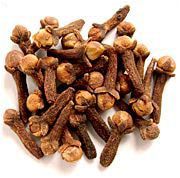The most important relationship I seek to nurture in the treatment room is the one a patient has with their own body. We live in a culture that teaches us to override pain, defer to outside authority, and push through discomfort. Patients often arrive hoping I can “fix” them, but the truth is, we can’t do the work for them. We can offer guidance, insight and support, but healing requires their full participation.
Herbs & Botanicals
Cloves (ding xiang)
What are cloves? What are they used for?
Cloves consist of the flower buds of the syzygium aromaticum plant, which is native to the Molucca Islands but is now cultivated in tropical regions worldwide. The clove resembles an evergreen tree, with short, lance-like leaves and whitish-pink flowers. The buds are picked by hand, then dried, before being added to herbal preparations. The main ingredient in cloves is an essential oil, which has antiseptic, antibacterial, antifungal, antiviral, antispasmodic and anesthetic properties.
 In traditional Chinese medicine, cloves have pungent and warm properties, and are associated with the Spleen, Stomach and Kidney meridians. Its functions are to dispel cold, warm the middle burner, push rebellious stomach qi downward, and warm kidney yang. Among the conditions treated by cloves are hiccoughs, poor appetite, nausea, diarrhea, weakness and paresthesia in the lower limbs, and impotence. The German Commission E has recommended that cloves be used to treat inflammatory changes of the oral and pharyngeal mucus membranes, and can be used in dentistry as a form of topical anesthesia.
In traditional Chinese medicine, cloves have pungent and warm properties, and are associated with the Spleen, Stomach and Kidney meridians. Its functions are to dispel cold, warm the middle burner, push rebellious stomach qi downward, and warm kidney yang. Among the conditions treated by cloves are hiccoughs, poor appetite, nausea, diarrhea, weakness and paresthesia in the lower limbs, and impotence. The German Commission E has recommended that cloves be used to treat inflammatory changes of the oral and pharyngeal mucus membranes, and can be used in dentistry as a form of topical anesthesia.
How much cloves should I take?
The typical recommended dosage of cloves is between 2 and 5 grams, depending on the condition being treated. Powdered cloves can be taken internally to treat diarrhea and nausea, and to improve appetite. Typically, clove oil is used as a mouthwash, in a dose of 1 to 5 percent diluted essential oil to 95-99 percent water. Undiluted essential oil is used in dentistry.
What forms of cloves are available?
Cloves are available whole, dried, or ground a fine powder. Clove oil is also available, usually as an extract or tincture.
What can happen if I take too much cloves? Are there any interactions I should be aware of? What precautions should I take?
The American Herbal Products Association has given cloves a class 1 rating, meaning that they can be consumed safely when used appropriately. However, cloves should not be used in cases of external heat or yin deficiency. In addition, they should not be taken with curcuma root. Concentrated doses of clove oil may cause an irritation of the mucus membranes; in these instances, use of clove oil should be discontinued. As of this writing, there are no known drug interactions with cloves. As always, make sure to consult with a licensed health care provider before taking cloves or any other herbal remedy or dietary supplement.
References
- Blumenthal M, Busse W, Goldberg A, et al. (eds.) The Complete German Commission E Monographs. Therapeutic Guide to Herbal Medicines. Boston: Integrative Medicine Communications, 1998, p. 112.
- Cai L, Wu CD. Compounds from syzygium aromaticum possessing growth inhibitory activity against oral pathogens. JNP 1996;59(10):987-990.
- Gruenwald J, Brendler T, Jaenicke C (eds.) PDR for Herbal Medicines. Montvale, NJ: Medical Economics Company, 2000, pp. 195-196.
- McGuffin M, Hobbs C, Upton R (eds.) American Herbal Products Association's Botanical Safety Handbook. Boca Raton, FL: CRC Press, 1997, p. 113.
- Xu ZL. Pocket Handbook of Chinese Herbal Medicine. Miami: Waclion International, 2000, p. 70.


